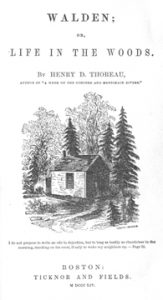Zilpah, whose name is spelt as “Zilpha” by Thoreau in Walden, was likely enslaved by Chambers Russell as a child. Zilpah’s parents are believed to be the enslaved man Lincoln of the Chambers estate, and the enslaved woman Zilpah of the Russell estate. After her original slaveholder died, Zilpah and her brother Peter were inherited by Charles Russell. After the Battle of Bunker Hill, Charles Russell and his family fled Massachusetts, abandoning Zilpah and Peter to their freedom.
Peter’s widow and children were the first free black people to live in Walden Woods when they moved there around 1775. Zilpah moved to Walden Woods soon after her brother’s family. By the end of her life, Zilpah had spent over 40 years living on her own in Walden Woods where she lived in a one room cabin, quite like the cabin Thoreau later built and lived in. Her other brother, Brister Freeman, was one of her neighbors.

Both Zilpah and Thoreau used their one room cabins for many purposes. They cooked, ate, worked, and slept in the same room. Because Zilpah only had a thin strip of land to use outside her house, Zilpah, unlike Thoreau, used her space as a barn, too. She kept her dogs, cats, and hens inside with her.
In her early years at Walden, Zilpah relied on skills she had learned while enslaved to provide for herself. Using a spinning wheel she probably brought over from the abandoned Russell estate, Zilpah spun raw cotton, wool, and flax into thread. This work took a strain on Zilpah, and she nearly went blind. Henry Thoreau writes that Zilpah “spun linen for the townsfolk, making the Walden Woods ring with her shrill singing, for she had a loud and notable voice.” Even though Walden Woods was out of the way, Zilpah would not let the town forget her presence.
To supplement the money she made spinning linen, Zilpah accepted donations from the Concord Female Charitable Society (CFCS) which provided her with tea, sugar, and clothing. Zilpah was the only former slave to receive regular donations from the CFCS. Usually, former slaves in Concord could expect to receive a donation only when they were on their deathbeds. Perhaps Zilpah was given special treatment because she was known to attend church regularly.
Despite this charity and her spinning, Zilpah still had trouble getting enough food. In Thoreau’s passage on her, he writes “that as [his friend] passed her house one noon he heard her muttering to herself over her gurgling pot, — ‘Ye are all bones, bones!’” Meat was difficult to obtain, but sometimes Zilpah got a little extra help. Thoreau notes in his journal that “Minott says he and Harry Hooper used to go to Howard’s meadow…when it was flowed, killing fish by striking the ice above them and stunning them.” Minott and Hooper “gave some to Zilpha as they went by.”
In 1813, when Zilpah was 75 years old, her house was burned down with her animals inside. No one tried to put out the fire. When Thoreau reports the event in Walden, he blames English soldiers for the fire. However, it is possible that community members were guilty, and that the soldiers were merely scapegoats.
After rebuilding her house, Zilpah lived in Walden Woods another seven years until her death on April 16, 1820. She was 82 years old. The Middlesex Gazette printed a short obituary, noting that “Zilphah White, a woman of color” was dead. “For a number of years, she had led a life of a hermitess, in a small place, which scarcely would bare the name of a hovel.” In twenty-five years, Henry David Thoreau would make this type of hovel-living in Walden Woods famous.
To learn more about the early residents of Walden Woods, read
- Former Inhabitants
- Lemire, Elise. Black Walden: Slavery and Its Aftermath in Concord (Philadelphia: University of Pennsylvania Press, 2009).

